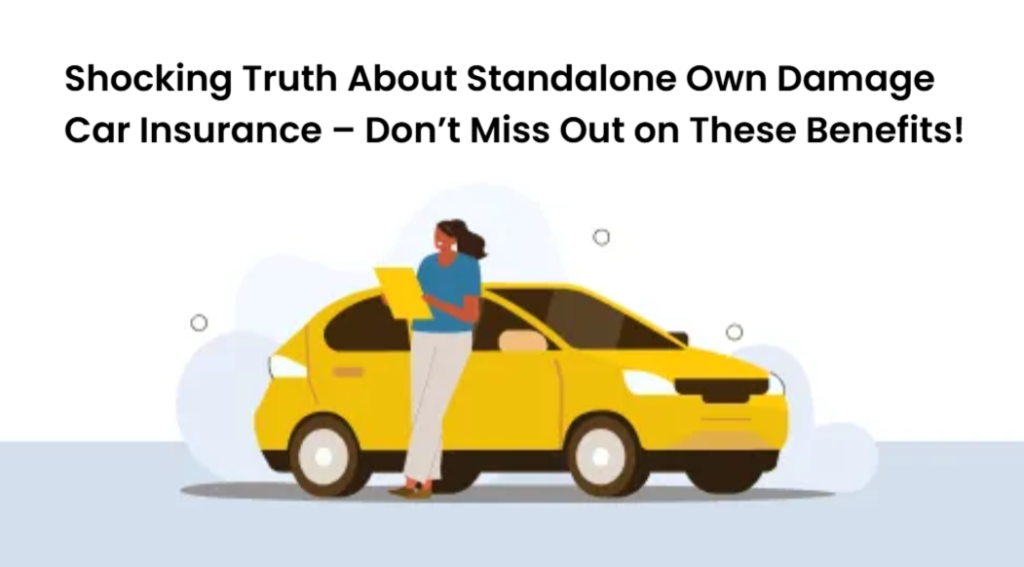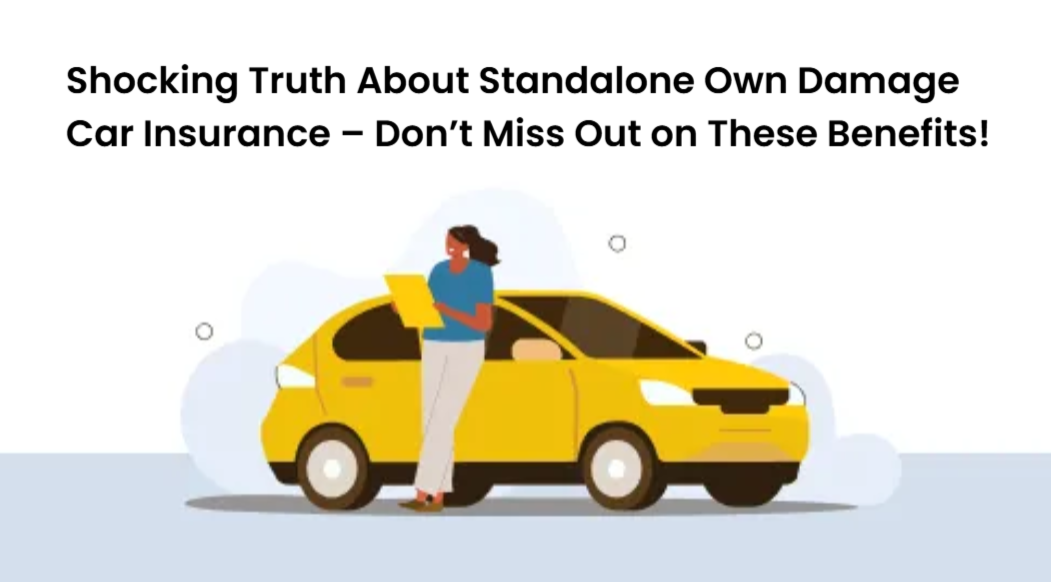Owning a car comes with both joys and responsibilities. Driving lets you travel when you want, but it also puts your vehicle at risk. Accidents, natural disasters, theft, and fire are all potential dangers. Fixing a damaged vehicle can be costly. Without good insurance, these expenses can create a heavy financial burden for car owners. This is where Standalone Own Damage (OD) Car Insurance plays a crucial role.
In India, every vehicle owner is legally required to have third-party car insurance under the Motor Vehicles Act, 1988. Third-party insurance covers damages or injuries to others. It does not protect your own car. That’s why many car owners choose standalone damage insurance. It helps pay for repairs if their vehicle is damaged unexpectedly. Although this coverage is not mandatory, it is highly beneficial in protecting you from expensive repair bills.
Let’s take an in-depth look at Standalone Own Damage Car Insurance, what it covers, what it excludes, and why every car owner should consider getting it.

What is Covered Under Standalone Own Damage Insurance?
A standalone own damage insurance policy provides financial help if the policyholder’s vehicle is damaged. Here’s what is covered under this plan:
1. Accidental Damages
No matter how carefully you drive, accidents can still happen. Whether it’s a minor scratch or major damage due to a road collision, repairs can be expensive. An OD insurance policy covers these costs, reducing your financial burden.
2. Theft of the Vehicle
Car theft is a serious concern, especially in urban areas. If your insured car gets stolen, the insurance provider compensates you for the loss by paying the Insured Declared Value (IDV) of the vehicle. This amount is based on the car’s current market value.
3. Fire and Explosions
If your vehicle is damaged beyond repair by fire, lightning, an explosion, or self-ignition, your OD insurance policy will cover the loss.
4. Natural Disasters
Natural calamities like floods, earthquakes, cyclones, and landslides can severely damage your vehicle. Standalone own damage insurance ensures that you do not have to pay for these damages out of pocket.
5. Damage Due to Riots and Vandalism
Social disturbances, riots, or acts of vandalism can lead to severe vehicle damage. If your car gets harmed in such situations, OD insurance provides compensation for the repairs.
If your car sustains damages due to any of the above incidents, you can file a claim with your insurance company. Digitalization has made it simple for insurers to provide an easy online claim process. Now, policyholders can quickly get the financial help they need.
Boost Your Protection with Add-Ons
A standalone OD policy gives you good coverage. You can boost your protection by choosing helpful add-ons. These optional riders enhance your policy’s benefits and ensure greater financial security.
1. Zero Depreciation Cover
Standard insurance policies deduct depreciation when settling claims. A zero depreciation add-on means you get the full claim amount. There are no deductions for depreciation. This helps you receive the most money for repairs and replacements.
2. Consumables Cover
Car repairs often involve replacing consumable parts such as engine oil, nuts, bolts, and brake fluid. A consumables cover add-on helps you recover the cost of these items, reducing your out-of-pocket expenses.
3. Return-to-Invoice Cover
In case of total loss due to theft or severe damage, insurance companies typically reimburse you based on the depreciated value of the car (IDV). With a return-to-invoice add-on, you receive the original invoice value of the car, ensuring a higher compensation.
4. Roadside Assistance Cover
Breakdowns can happen at any time. A roadside assistance add-on offers helpful services. These include towing, fuel delivery, battery jump-starts, flat tire help, and minor repairs. This cover ensures that help is just a call away.
Adding these riders to your own damage car insurance policy enhances your coverage and provides added peace of mind.
What is Not Covered Under Own Damage Car Insurance?
OD insurance offers wide protection, but policyholders should know the specific exclusions:
- Third-Party Liability – This policy does not cover injuries or damages caused to another person or their property. You need a separate third-party liability insurance for that.
- Driving Without a Valid License – If you meet with an accident while driving without a valid driver’s license, your claim will be rejected.
- Drunk Driving or Drug Influence – If an accident occurs while driving under the influence of alcohol or drugs, the claim will be invalid.
- Negligence by the Owner – Damages caused due to negligence, such as ignoring minor issues that later lead to major damage, may not be covered.
- War or Nuclear Risks – Any losses due to war, terrorism, or nuclear explosions are not covered.
- General Wear and Tear – Regular wear and tear, mechanical breakdowns, and electrical failures are not covered under this policy.
Understanding these exclusions helps policyholders avoid claim rejections and maximize their insurance benefits.
Who Should Buy Standalone Own Damage Insurance?
A standalone own damage policy is ideal for:
- Car owners with third-party insurance: Adding an OD policy gives full coverage for your vehicle’s damages.
- Residents of High-Risk Areas – If you live in areas prone to theft, floods, or accidents, OD insurance ensures financial security.
- New Car Owners – If you recently bought a car, OD insurance helps you protect your investment from unforeseen incidents.
- Luxury Car Owners – High-end vehicles can be pricey to repair. So, OD insurance is key for financial protection.
How is the Premium for OD Insurance Calculated?
The premium for own damage insurance depends on multiple factors, including:
- Vehicle Age – Older vehicles have lower premiums due to depreciation.
- Car Model and Make – High-end vehicles have higher premiums due to expensive spare parts and repair costs.
- Insured Declared Value (IDV) – The higher the IDV, the higher the premium. IDV represents the car’s market value.
- **Geographical Location** – Vehicles in big cities usually cost more to insure. This is because there’s a greater risk of theft and accidents.
- Fuel Type – Diesel cars typically have higher premiums than petrol cars.
To estimate your premium, you can use an online car insurance calculator on your insurer’s website. This tool helps policyholders compare plans and make informed decisions.
Final Thoughts
Third-party insurance is required. A standalone own damage policy offers extra financial protection. It covers repair and replacement costs for your vehicle. Getting this coverage helps you avoid costly repairs from accidents, theft, or natural disasters.
Adding options such as zero depreciation, consumables cover, and roadside assistance boosts your protection and convenience. Always compare policies, assess your coverage needs, and choose a plan that best fits your budget.
Drive safely, stay insured, and enjoy a worry-free journey knowing your car is well-protected.
Must read:
- Shocking Homeowners Insurance Secrets: What’s REALLY Covered (And What’s NOT!)
- Shocking Travel Insurance Mistakes That Could Drain Your Wallet – Don’t Make These Costly Errors!
- Shocking Truth: Does Health Insurance Cover Alternative Medicine? You Won’t Believe the Answer!
Frequently Asked Questions (FAQs)
Is own damage car insurance mandatory?
No, standalone own damage insurance is not mandatory. However, it is highly recommended for financial protection against damages to your own vehicle.
Can I buy own damage insurance without third-party insurance?
No, you must have a valid third-party car insurance policy before purchasing a standalone OD policy.
Can I transfer my OD insurance if I sell my car?
You can transfer your OD insurance policy to the new owner. Just tell your insurance provider and fill out the needed paperwork.
How can I file a claim under my own damage insurance?
You can file a claim online by logging into your insurer’s portal, filling up the claim form, and submitting the necessary documents. The insurer will inspect the damage and approve the claim accordingly.
Will my premium increase if I make an OD insurance claim?
Yes, making an OD insurance claim may lead to the loss of No Claim Bonus (NCB), which could result in a higher premium during policy renewal.
